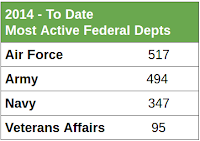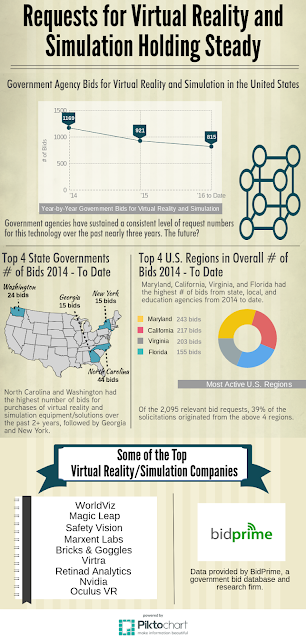How time flies when one is looking into the future. Over 80 years ago, noted science-fiction author, Stanley G. Weinbaum, envisioned and wrote about a technology that would enable the user to journey to a fictional setting. In reality, we know now that Weinbaum was describing is what we understand to be virtual reality.
You're likely aware that the gaming industry, filmmakers, and healthcare have long drawn on the power of virtual reality and simulation, but were you aware that government agencies, law enforcement, and the military are purchasing and applying the technologies also? Much like the private sector and John and Joan Q. Consumer, U.S. state, local, education and federal agencies are seeking and procuring powerful computer and mobile driven technologies.
A key driver has been the rapidly thriving graphics and 3D industries helping to stimulate virtual reality and simulation product advancements. For example, many in law enforcement are using virtual reality and simulation technology to train officers on use of lethal force situations, firearms and incident response training, and more. See what Ava Kofman wrote in The Guardian about agencies putting virtual reality to use in training programs.

There appears to be no end in sight for the industry. As reported in Forbes, Alexa Davis noted in her article, "Virtual Reality, Real Profits: 11 Great Stocks To Play The Coming VR/AR Boom", "A recent Goldman Sachs research report predicts the VR/AR industry, which introduces users to virtual realities and brings digital information to the physical world, may soon become an $80 billion market ($45 billion in hardware and $35 billion in software) by only 2025." As usual, public sector investment has played a meaningful in this progress.
Since January 2014, there have been 2,905 government bid requests for virtual reality and simulation type solutions.
Here are the four states which have spearheaded the solicitations activity. BidPrime, an industry leader in the government bid database and research industry, identified and reported that Maryland, California, Virginia and Florida are the leading U.S. states in terms of overall number of government bids issued since January 2014.

Back in May 2016, Mohana Ravindranath reported in NextGov how federal government agencies continue to use virtual reality to meet training needs, but there are possibilities for state and local departments as well. As noted in, 'Is Virtual Reality the Key to Government's Training Woes?', cost savings is a major motivation for taking advantage of the technology.
Federal departments have led substantially in the overall number of relevant bids submitted. Over the past thirty-three months, October 2014 is the only month in which applicable federal bids did not outdistance state and local.

Since 1929, when Edward Link created his “Link trainer”, the first flight simulator, the military has continued to use simulators to train pilots. Having experienced an RF-4 Phantom simulator at RAF Alconbury, in Alconbury, England, I can attest to the "reality" of flight simulators. The military continues to expand their use of virtual reality and simulation to provide real world experience for combat, medical, vehicle operation, and other training genres.
Overview of bid request activity for Virtual Reality and Simulation:

Stanley Weinbaum and the other forefathers of science-fiction couldn't possibly have predicted where virtual reality and simulation are today. There continues to be compelling evidence that use of the technologies is, and will, continue to rapidly multiply. As certain, the public sector will be right there for the fascinating journey. What's next?
Sample Active Bids/RFPs
Virtual Reality & Simulation
For more information, visit BidPrime or call us at 888.808.5356.

